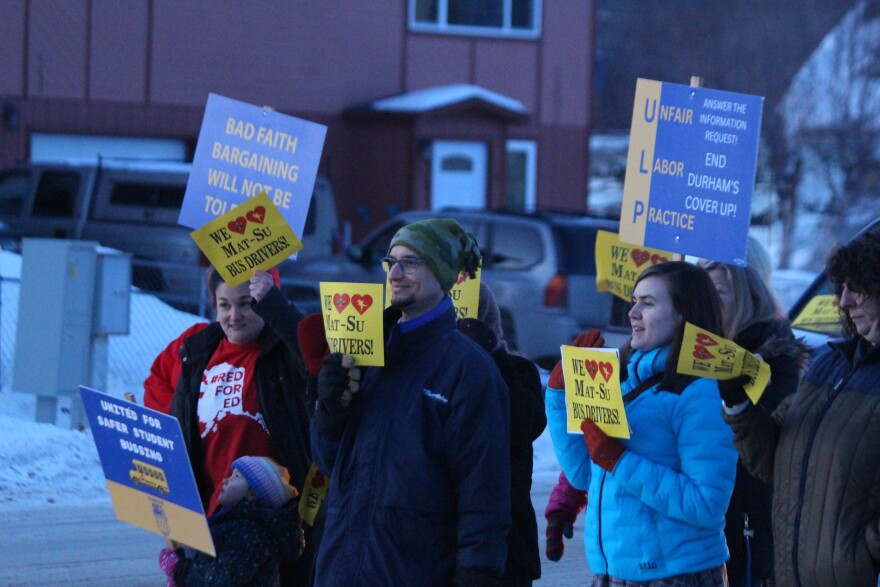Thousands of Matanuska-Susitna Borough students have now gone without bus service for more than two weeks. And there’s still no end in sight.
Bus drivers continue to strike over their contract. The company that employs them says it won’t return to negotiations for at least a week.
For families caught in the middle, it’s becoming a big problem.
“It’s been really rough on us," Kent Schiebl, a father of two, told the local school board Wednesday night. "My wife had to resign from her job, and we’re down to one income because of no child care available to get our kids to and from school.”
Schiebel was among dozens of parents, bus drivers and community members who packed the Matanuska-Susitna Borough School Board meeting. They told the board of issues ranging from complicated carpools to bus safety to a lack of transportation access for students who have special needs. Most who testified blamed the operator of the buses, Durham School Services, for the ongoing strike. That included Kenneth McClamrock, one of many drivers decked out in bright chartreuse safety vests.
“We’re told by our dispatch from Durham — warning lights come on the dash, your check engine comes on, your ABS comes on, your reach inner triangle comes on — ‘Keep driving. Keep going as long as your gauges look good,’" McClamrock said. "We’re driving until the buses shut down.”
The drivers’ strike started Jan. 31. And contract negotiations came to a halt last week when Durham officials abruptly ended a negotiations meeting after presenting their last, best offer to the union. An email from regional Durham official Will Zimmerman to the union suggested meeting again, “in a week or two to learn if setting a new bargaining date might be fruitful.”
That means 6,000 to 7,000 of the district’s students will continue to have no bus service indefinitely.
Mat-Su Superintendent Randy Trani said the district is in an impossible spot.
Community members have called for the district to terminate the contract with Durham. But Trani said it’s not that simple, and it wouldn’t immediately end the strike.
“If magically, another contractor came in — literally with magic — and they had 160 buses, you’d still be negotiating a contract with a new place,” Trani said.
He also said there could be legal issues with suddenly cancelling the contract, and the school district may not seem like a good place for other contractors if it called off a 10-year contract, six months in.
Even before the strike, Durham had been the subject of controversy, with rolling bus cancellations and failure to get proper permits before it began operating in the Mat-Su. Edward Flavin, spokesman for Durham parent company National Express, said the company has been working with the school district to ensure it gets the proper permits.
“We were new to the state of Alaska when we started operations last year and worked quickly to understand and comply with all that is required to operate here,” Flavin wrote in a statement.
Flavin did not respond to questions about bus safety complaints.
Trani said the district can’t interfere with the contract negotiations directly, and there’s not a lot it can do to hold Durham accountable.
“The way that we can hold Durham accountable is through the contract," Trani said. "That’s our mechanism.”
At the meeting, Trani presented a list of alternative transportation options. The suggestions included reconfiguring bus services to have longer routes and fewer buses and opening school earlier and later in the day to better work with parent work schedules. He also talked about providing gas cards to families who now have to transport their kids or getting rid of bussing altogether.
“I’m sure everybody has an idea they hate on this list," Trani said. "The idea was to get information out there for you all to think about.”
In the meantime, parents will have to contend with difficult transportation arrangements as the strike continues.
Parent Audrey White said she’s been driving six kids to school, up from her usual three, to help friends. She said she’s concerned about safety issues, and access for students.
“I have a special needs son who, according to his IEP, is supposed to have services, and doesn’t," White said. "But with everything that I am finding out about the bus safety, and my brother who drives buses down in the states, I wouldn’t put my son or my daughter back on those buses until they’re fixed.”
During the strike, district officials say 2% of students have been absent, and the district is seeing six to seven students a day transferring out of a Mat-Su school.




